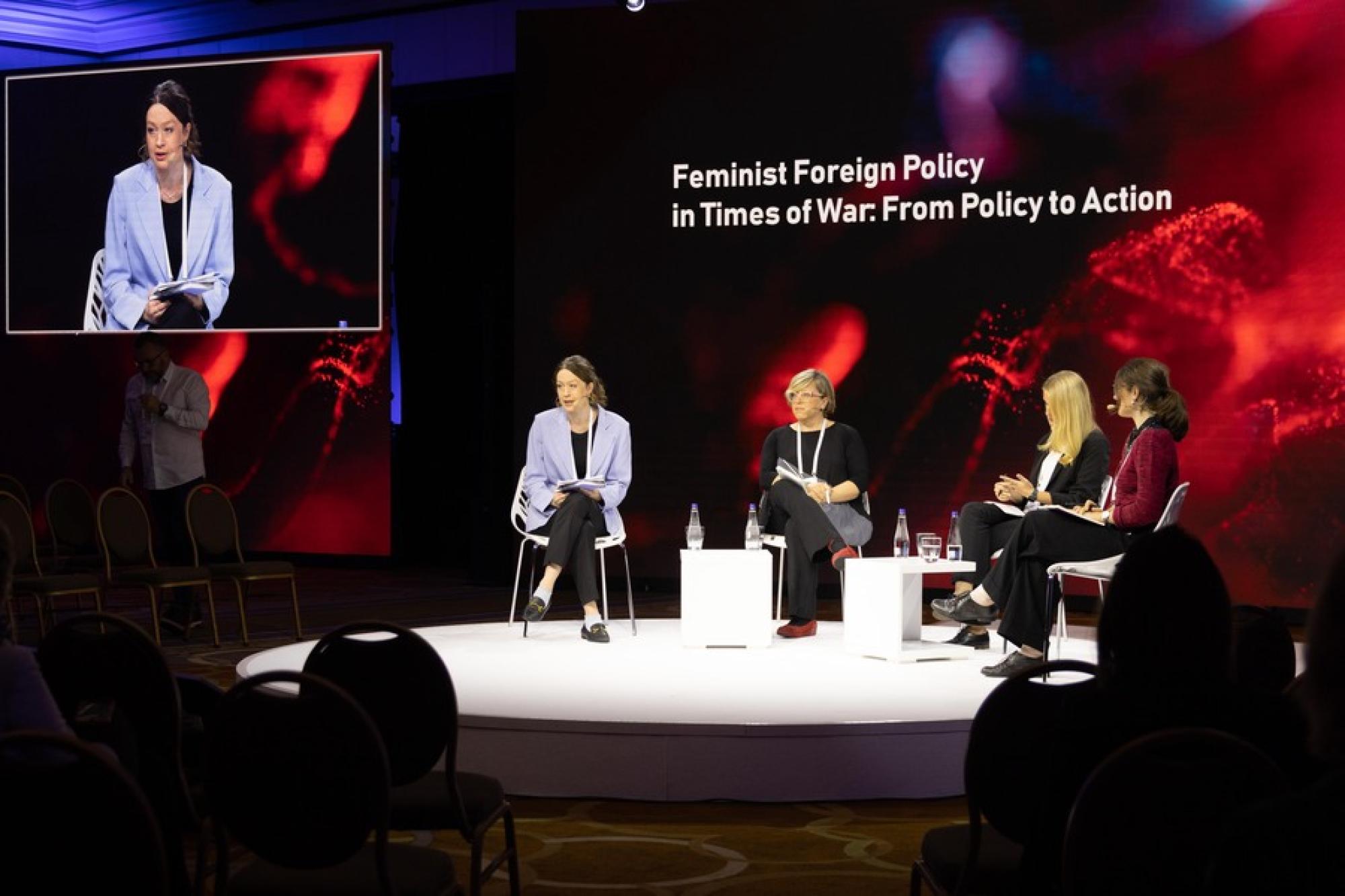Feminist Foreign Policy in Times of War: Insights from the Belgrade Security Conference
Serafine Dinkel discussed "Feminist Foreign Policy in Times of War" at Belgrade Security Conference 2023

At Belgrade Security Conference on 13 October 2023, Serafine Dinkel discussed "Feminist Foreign Policy in Times of War" with panellists Marie Jelenka Kirchner (Institute for Democracy Societas Civilis – Skopje and University of Graz), Dr. Elena Stavreska (University of Bristol) and Karolina Leakovic (Social Democratic Party of Croatia). The conversation revolved around the transformative potential of Feminist Foreign Policy (FFP), its challenges, and regional perspectives from the Balkans.
Feminist Foreign Policy (FFP) is a multifaceted concept that defies a single, universal definition – just as there are several “feminisms”. One definition, presented by the Centre for Feminist Foreign Policy (CFFP), describes FFP as a political framework that centres around the well-being of marginalized individuals and challenges the established global systems. It calls for an alternative and intersectional approach to security, focusing on the experiences of women and marginalized groups while critiquing systems of patriarchy, colonization, capitalism, and more. Importantly, FFP is designed to benefit everyone, embracing both inclusivity and intersectionality.
Several countries, including Sweden, Canada, and Mexico, have incorporated feminist perspectives into their diplomacy since at least 2014. In contrast, Germany and Slovenia are newcomers in embracing the "Feminist Foreign Policy" label. However, FFP faces challenges from populist governments and crises, as demonstrated by Sweden's experience of abandoning its feminist foreign policy under a new right-wing government.
In the German context, the commitment to a "Feminist Foreign Policy" was enshrined in the coalition treaty of the current government. Consultations with civil society and experts shaped the guidelines for Germany's Feminist Foreign Policy, officially introduced in February 2023 alongside feminist development policy guidelines. The conceptualisation of the guidelines took place in the context of Germany’s security-policy “Zeitenwende” after Russia’s invasion of Ukraine.
These guidelines operate with a Swedish-inspired "3R+D" framework, emphasizing Rights, Resources, Representation, and Diversity. They focus on strengthening the rights, representation, and resources of all marginalized groups, promoting human rights, and fostering true inclusion – in an intersectional, rather than just women-centred sense – in foreign and security policy. The guidelines aim to allocate 85% of aid to gender-sensitive projects and 8% to gender-transformative projects by 2025. Despite this ambition, there remains a lack of coherence in the approach, as the FFP documents are issued only by the Foreign and Development Ministries respectively, and do not reflect a cross-government approach. This means that although FFP finds mention in the government-wide National Security Strategy published in June, the Strategy does not reflect the same transformative ambition as the Guidelines.
The discussion during the Belgrade Security Conference emphasized the importance of FFP in times of war, highlighting its potential to bring about transformative change. It also underlined the challenges and limitations of the concept, particularly in the face of increasing global crises. Additionally, the conversation provided valuable regional perspectives from the Balkans.
The outcomes of these discussions shed light on critical aspects of FFP:
Intersectionality: FFP strives to take an intersectional perspective, ensuring that the experiences of all vulnerable and marginalized groups are reflected in foreign policy decisions.
Historical Roots: FFP has deep historical roots, extending way beyond 2014. It is firmly rooted in state practice within the Women, Peace, and Security Agenda, dating back to 2000. Moreover, feminist civil society has been advocating feminist perspectives in global politics for over a century.
Obligations and Expectations: Attaching the label "FFP" to foreign policy creates obligations and expectations on governments. Even if all FFP requirements are not fully implemented, governments will be held to its standards.
Context Matters: There is no one-size-fits-all approach to FFP. Every policy must reflect the cultural, socio-political, and historical context of the region it applies to. This is particularly relevant in the Balkans, where the role of women's civil society groups during the conflicts of the 1990s is notable.
Connecting the Domestic and Global: FFP recognizes the intricate connection between domestic and global issues. It underscores the need to understand how individual experiences are intertwined with broader structural forces.
Civil Society Alliances: To address the growing polarization and pressure from anti-gender movements, civil society needs to collaborate in alliances to advance the principles of FFP, fostering inclusivity, gender equality, and respect for human rights.
In conclusion, the Belgrade Security Conference provided a platform for insightful discussions on FFP, emphasizing its significance in times of war. Thank you to the Belgrade Center for Security Policy for hosting this conversation.
The panel can be watched here, starting at 4:08:00: https://www.youtube.com/watch?v=H1egoKL83yI&themeRefresh=1.
See also:
Dinkel, Serafine, Dana Schirwon and Leonie Stamm. (2022). Integrating Feminist Foreign Policy Into the National Security Strategy. German Council on Foreign Relations.
Picture credit: Belgrade Security Conference 2023.
